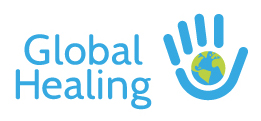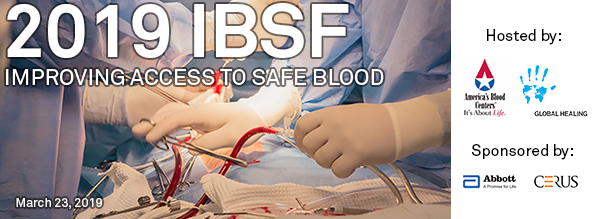Originally printed in the ABC April 2019 Newsletter. Click here to subscribe to ABC’s newsletter. Contributed by Chris Gresens, Senior Chief Medical Officer, North & West Divisions, Vitalant and Susan Rossmann, MD, PhD, Chief Medical Officer, Gulf Coast Regional Blood Center.
On March 23rd, the America’s Blood Centers (ABC) and Global Healing International Blood Safety Forum (IBSF) brought together representatives from professional societies, blood centers, for-profit companies, and the U.S. Military – to learn and discuss the contributions of each sector in assisting blood systems in low and middle-income countries (LMICs). In an era when financial support for work in blood safety and availability has fallen considerably, government funding in this arena, such as that provided by the United States’ President’s Emergency Plan for AIDS Relief (PEPFAR) program, has largely dried up while very few blood systems in LMICs have achieved the ability to establish, much less maintain, appropriate inventories of safe blood without external financial and technical support. Currently, much of the assistance comes from private sources and international programs via grassroots activities.
This one-day meeting featured short presentations followed by constructive, robust discussions among attendees. Jim MacPherson, president of MacPherson Strategies, Global Healing’s Board Chair, and former CEO of ABC, opened IBSF with a welcome and overview in which he emphasized the tremendous need for both governments (in and outside of the affected LMICs) and private philanthropies to work together to support meaningful and sustainable improvements in the availability and safety of blood products and plasma-derived medicines. One of his most resonant statements was that, “every year a million kids die from anemia and tens of thousands of mothers die from hemorrhage delivering their children [and] millions more need surgeries that can’t be done without blood; meeting those needs should be our ultimate goal.”
Next Bloodworks Northwest President and CEO James AuBuchon, MD, FCAP, FRCP(Edin) delivered the keynote address, “Yes, You Can!” Dr. AuBuchon spoke on sharing our blood banking wealth in a variety of ways and noted how all successful healthcare activities, including those focusing on blood safety and availability, require the presence of mostly non-medical fundamentals such as reasonable-quality roads and electricity, education, and healthcare training. He also observed how basic, life-saving services are estimated to cost $44 per person, worldwide, but 13 percent of countries spend less than this amount. Only half of needed blood is available worldwide, as internal revenue sources in LMICs have not replaced loss of international blood-focused assistance.
Dr. AuBuchon continued by stating how this situation is especially dire in many of the poorest LMICs. For example, most Sub-Saharan African countries (where, aside from South Africa, blood collections are far lower than the World Health Organization’s (WHO) target of 10 per thousand population) need far more blood products than are available to care for patients ravaged by severe malaria and maternal hemorrhage, let alone to support trauma management, general surgery, and oncology. However, several ways in which smaller contributions of dollars from wealthier blood centers, individuals, and charitable groups can have a large effect – most notably in training and “twinning” program activities. One of Dr. AuBuchon’s most salient recommendations was embodied by his comment: “[a]lthough advances in health spending and health care have been seen in developing countries, their quality systems, donor recruitment abilities, and underlying knowledge base are all excellent opportunities for teams from developed countries to join in their improvement efforts.” Following Dr. AuBuchon’s presentation, fourteen additional speakers shared their experiences in this area, as is summarized here.
While the approaches they shared varied, some common themes emerged, including the need for thoughtful and realistic national blood policies and quality systems affecting all transfusion-related areas in a “vein-to-vein” manner – i.e., from donor recruitment and collections through product testing and storage all the way to patient transfusions. Training of personnel was emphasized by several as a major area where our community can continue to play a major (and often low-cost) role. U.S. Navy Commander Jonathan Hoiles, director of the Navy Blood Program, in his closing remarks, discussed how dedicated individuals, when supported generously by their respective organizations, can achieve important outcomes. In summary, ABC Chief Medical Officer Louis Katz, MD concluded, “[a]lthough advances in health spending and health care have been seen in developing countries, enhanced attention to their systems, donor recruitment, and under-lying knowledge base are all excellent opportunities for teams from developed countries to join in their improvement efforts.” Preliminary feedback indicates that the Forum achieved its purpose and objectives. Finally, ABC, Global Healing, IBSF attendees, and the blood community would like to thank John Donnelly, PhD for his contributions and leadership in the success of Global Healing and IBSF. His substantial efforts in support of globally equitable access to quality healthcare (including transfusion medicine), during his military and civilian careers have left an indelibly positive impression throughout the world.

